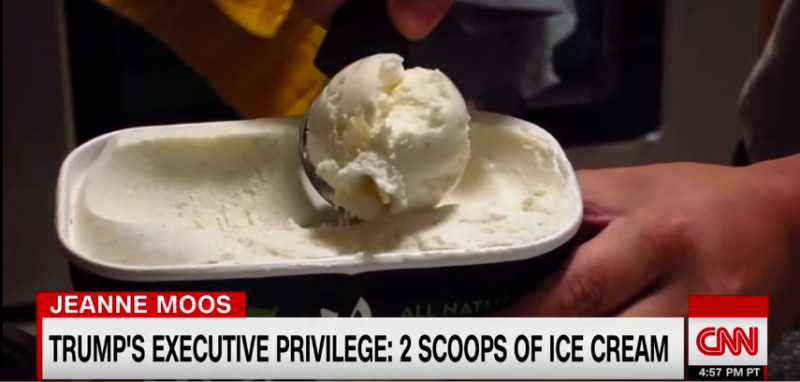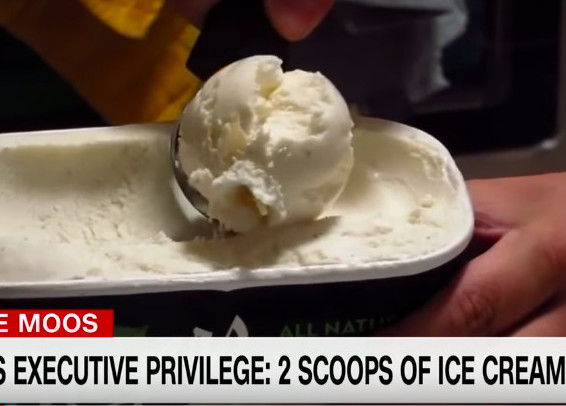Sign up for The Media Today, CJR’s daily newsletter.
Since before President Trump was sworn in, CNN has been perfecting the art of the chyron—those words that run along the bottom of the screen. Instead of a neutral summary, the chyrons now provide commentary on the news being reported and the people being interviewed. At times they even make a meta comment on the state of the news itself.
In 2016, CNN featured the chyron “Trump: I never said Japan should have nukes (he did).” It prompted a piece from Vox crediting the network with figuring out how to cover Trump’s constant lying.
ICYMI: Everyone is admitting what they get paid to work in journalism
The pattern continued after his inauguration. “Trump says ‘Saturday Night Live’ is anti-GOP and should be looked into;’ no, this chyron is not a joke,” read one in February 2017. “Trump falsely claims media isn’t reporting terror attacks,” read another that same month. Later that year, there was an instant classic: “President gets 2 scoops of ice cream, everyone else 1.”

Screen grab via CNN/YouTube
In 2018, there were such offerings as, “Just in: Steve Bannon says MLK Jr would be ‘proud’ of Trump” and “Trump: I don’t support Wikileaks (He loved it in 2016).” This summer, there was “Trump: First lady has gotten to know Kim Jong Un; White House: First Lady has never met Kim Jong Un.” More recently, there was “Trump’s avalanche of absurd Twitter typos,” accompanying a segment on Twitter typos, and “Small cracks in GOP ranks as rough transcript shows Trump pushed Ukraine’s president to investigate Biden” below a clip of Lindsey Graham talking about why it would be insane to impeach the president over the phone call to Volodymyr Zelensky. (It was followed by a clip of Graham saying something wholly contradictory about Bill Clinton in the 1990s and David Gregory lamenting that Graham today is unrecognizable.)
The chyrons are clever. They’re cute. They’re wry. I am amused by the chyrons. They’ve been credited as a way to fact-check. Some, like the one referring to Kim Jong Un, make it clear to me that I’m watching a segment about someone lying. But most of the time, they’re just not what I am taking away from the segment. Not really.
RELATED: More from CJR’s public editors
The chyron does not change the fact that I’m watching a segment which airs Trump’s claims that SNL is anti-Republican. The chyron undermining Bannon’s claim that a civil rights hero would support a profoundly divisive president does not change the fact that CNN is still covering Bannon’s words, long after he left the White House. Twitter typos and Lindsay Graham’s character still got airtime—despite the fact that both, at present, measure up to little more than public embarrassments.
These particular chyrons are smirks, or winks. They tell us that CNN knows that, once again, it is covering something Trump said that is not true. But a complement is not a substitute. We are now almost three years into the Trump administration. It’s been almost four and a half years since Trump announced he was running for president. It has ceased to be charming to throw up a gotcha chyron while continuing to let Trump’s egregious claims dictate news coverage, and to focus on characters like Bannon (or Anthony Scaramucci, who was in the White House for 11 days), or to center Trump sycophants like Graham in the American political narrative.
What appears on the chyron matters. But it can’t cleanse the sins of the show running on top of it. I love a good chyron. A good chyron demonstrates sound judgment, clarity, and wit. But the best chyrons are those that accompany segments that demonstrate the same things.
Has CNN cracked the code on the Trump presidency with chyrons? See the headline for the answer.
ICYMI: Our campaign to ban 7 words/phrases abused by journalists
Editors note: CJR has appointed its own outside public editors for four vital news outlets — The New York Times, The Washington Post, CNN and MSNBC — that currently lack any public ombudsman. You can reach them at publiceditors@cjr.org. (Any messages will be treated as off-the-record unless otherwise agreed.)
Has America ever needed a media defender more than now? Help us by joining CJR today.



